All issues

Volume 14 (2003)
- Issue 6 Pages 487-
- Issue 4 Pages 295-
- Issue 3 Pages 193-
- Issue 2 Pages 75-
- Issue 1 Pages 3-
Predecessor
Volume 14, Issue 2
Displaying 1-9 of 9 articles from this issue
- |<
- <
- 1
- >
- >|
Reviews
-
Hiroshi TAKAYAMA2003 Volume 14 Issue 2 Pages 75-81
Published: 2003
Released on J-STAGE: April 25, 2008
JOURNAL FREE ACCESSDownload PDF (387K) -
Hiroshi MOHRI2003 Volume 14 Issue 2 Pages 82-90
Published: 2003
Released on J-STAGE: April 25, 2008
JOURNAL FREE ACCESSDownload PDF (537K) -
Tadayoshi KOSUGI, Masanori SUNAGAWA2003 Volume 14 Issue 2 Pages 91-100
Published: 2003
Released on J-STAGE: April 25, 2008
JOURNAL FREE ACCESSDownload PDF (436K) -
Shizuko TSUJI, Eric G. HUIZINGA2003 Volume 14 Issue 2 Pages 101-106
Published: 2003
Released on J-STAGE: April 25, 2008
JOURNAL FREE ACCESSDownload PDF (432K)
Original Article
-
Midori SHIMA, Ichiro TANAKA, Yohko KAWAI, Hajime TSUJI, Shin NAKAMURA, ...2003 Volume 14 Issue 2 Pages 107-121
Published: 2003
Released on J-STAGE: April 25, 2008
JOURNAL FREE ACCESSAcquired inhibitors against blood coagulation factors bring about severe and occasion-ally uncontrollable bleeding with high mortality. Reports on these disease conditions are apparently increasing in Japan, partly owing to advances in the technique and implementa-tion of blood coagulation assays. However, the present status including the incidence of such diseases has not extensively been studied and no standardized treatments for these diseases have so far been proposed in Japan. The Subcommittee on Blood Coagulation of the Japanese Society on Thrombosis and Hemostasis conducted a survey on the prevalence of these disease conditions over a period between January 2001 and May 2002. A total of 75 patients enrolled in this study with such acquired inhibitors, 58 were found to have inhibitors against factor VIII, 7 against von Willebrand factor, 5 against factor V, and one each against either prothrombin, factor XI, fibrinogen, a combination of factors VIII and V and fibrinogen, or a combination of factors VIII and XI. The remainder was not specifically classified. The male versus female ratio was 41 : 34, and the age ranged from 2 up to 80 years old. The underlying diseases or conditions in these patients were specified in 29 patients, and autoimmune disease, malignancy, lymphoproliferative disease, preg-nancy and diabetes mellitus were common among them. In the other 46 patients underlying diseases were not specifically determined. Factor VIII concentrates were used for hemorr-hagic complications in 22 cases, although their efficacies were poor. Inhibitor bypassing products, such as activated factor VII and (activated) prothrombin complex concentrates appeared to be more effective than the factor VIII concentrates with a successful outcome in 77-93% of cases treated with these substances. Oral prednisolone or other immunosup-pressive drugs was given in the majority of cases. The overall efficacy of immunosuppres-sive therapy appeared to be about 60%, and there was no difference in outcome among the treatment regimens. The inhibitors were found to have been eliminated in 37 cases, decreased in 14 cases and unchanged in 8 cases. The reported mortality was 14%.View full abstractDownload PDF (554K)
Technical Lecture
-
Tomoko MATSUMOTO, Midori SHIMA2003 Volume 14 Issue 2 Pages 122-127
Published: 2003
Released on J-STAGE: April 25, 2008
JOURNAL FREE ACCESSDownload PDF (273K)
Topic
-
Takayoshi HAMAMOTO2003 Volume 14 Issue 2 Pages 128-133
Published: 2003
Released on J-STAGE: April 25, 2008
JOURNAL FREE ACCESSDownload PDF (372K)
-
2003 Volume 14 Issue 2 Pages 134-159
Published: 2003
Released on J-STAGE: April 25, 2008
JOURNAL FREE ACCESSDownload PDF (1337K)
-
2003 Volume 14 Issue 2 Pages 160-184
Published: 2003
Released on J-STAGE: April 25, 2008
JOURNAL FREE ACCESSDownload PDF (1729K)
- |<
- <
- 1
- >
- >|